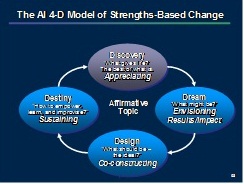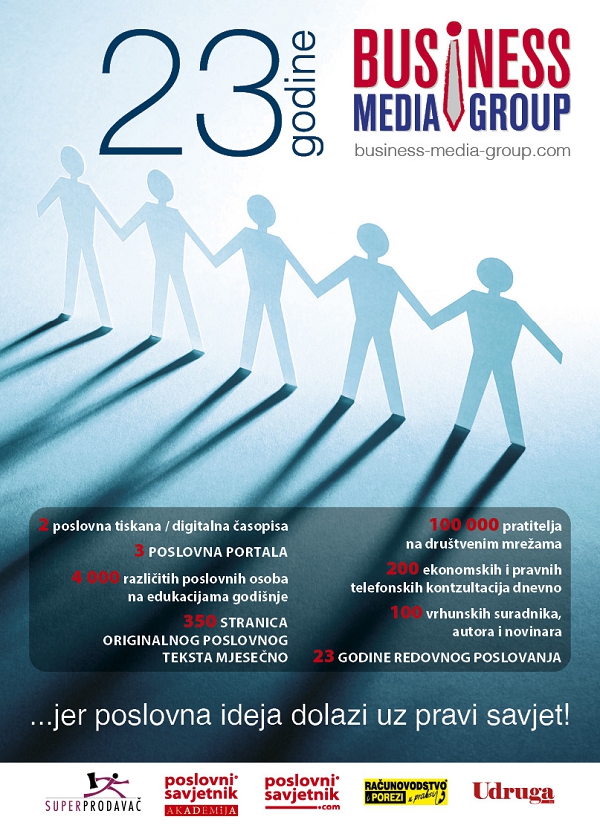JOHN LODDER: What is Appreciative Inquiry?
Appreciative Inquiry (AI) is a so called ‘strength based approach’ for development and change, both at individual as at organizational level. Since mid 1980’s, stimulated by modern psychology, Human Resource Management (HRM) departments and Organisation Development (OD) practitioners started to apply more and more strength based approaches in organisations.
In Croatia, as far as I know, Appreciative Inquiry was never applied. Recently, a top twenty Croatian company started the development of their new business strategy based on an AI approach.
In two columns I like to give you a short inside in the basic thinking and theory of Appreciative Inquiry. Then some examples from around the world, where and how AI is applied, to end with a fourth column in which I will describe the process and results of this Croatian AI project.
(The first articles are based on various AI sources.)
The difference between ‘traditional’ and ‘strength based’ approaches.
We learned and we are still taught to think in problems, analysing the problem and find a solution which we will then implement; unfortunately that results very often in the ‘management paradox’. Meaning by solving one problem in 80% of the cases management by doing so creates a new problem. This traditional problem-solving approach is generally done strictly top-down, supposed solutions are ordered to be executed by lower management and employees who were not involved in the decision-making process at all, sometimes they even were not aware of the problem they have to implement the solution for.
In short we look at the organisation or at people as a problem to be solved. And often management is surprised about ‘resistance to change’ effects.
In a strength based approach we look for what is already working well and based on that we think and talk innovative about possibilities to improve further toward the future. This process starts as a top-down process but involves very soon all relevant stakeholders, internal and external, to find common ideas and opinions about ‘what we all want to have’. Because the results are based on experiences and co-creation we will not see resistance to change but a spontaneous start of change and improvement initiatives in the entire company.
In short AI looks at organizations and at people as sources of creativeness, flexibility and skills. (see illustration: ‘ AI is a different way of thinking’ )
Problem Metaphor: Mystery Metaphor:
Organizations are machines; Organizations are
“problems to be solved” Living Systems; webs of relatedness;
“worlds of infinite strengths”
Traditional Appreciative Inquiry
"Felt need" Value
Problem Identification "the best of what is"
Analysis of cause Envison "what might be"
Seek solutions Dialogue "what should be"
Action planning Creating "what will be"
Appreciative Inquiry is the study and exploration of what gives life to human systems when they are at their best. It is an organization development approach based on the assumption that inquiry into and dialogue about strengths, successes, values, hopes and dreams is transformational in itself.
It is founded on the following set of beliefs about human nature and human organizing:
People individually and collectively have unique gifts, skills and contributions to bring to life. Organizations are human social systems, sources of unlimited relational capacity, created and lived in language.
- The images we hold of the future are socially created and, once articulated, serve to guide individual and collective actions.
Through human communication (inquiry and dialogue) people can shift their attention and action away from problem analysis to lift up worthy ideals and productive possibilities for the future. In short, Appreciative Inquiry suggests that human organizing and change, at its best, is a relational process of inquiry, grounded in affirmation and appreciation.
One way to understand Appreciative Inquiry is to consider the meaning of its two words. Each word alone has implications for the practice of organization change. The power of Appreciative Inquiry, however, is the by-product of the two words working together. Like hydrogen and oxygen that combine to make water - the most nurturing substance on earth - "appreciation" and "inquiry" combined produce a powerful, vital approach to leadership and organization change.
Appreciation: Recognition and Value Added
Appreciation has to do with recognition, with valuing and with gratitude. The word "appreciate" is a verb that carries a double meaning. It refers to both the act of recognition and the act of enhancing value. Definitions include:
- to recognize the best in people and the world around us;
- to perceive those things which give life, health, vitality and excellence to living human systems;
- to affirm past and present strengths, successes, assets and potentials;
- to increase in value (e.g., the investment has appreciated in value).
Indeed, organizations, businesses and communities can benefit by greater appreciation. Around the globe people hunger for recognition. They want to work from their strengths on tasks they find of value. Executives and managers long to lead from their values. They seek ways to integrate their greatest passions into their daily work. And organizations strive regularly to enhance their value to shareholders, employees and the world at large.
Inquiry: Exploration and Discovery
Appreciative Inquiry is about more than appreciation, recognition, and enhancement of value. It is also about inquiry. Inquiry refers to the acts of exploration and discovery. It implies a quest for new possibilities, being in a state of unknowing, wonder and a willingness to learn. It implies an openness to development. The word "inquire", also a verb, means: to ask questions, to study, to search, to explore, to delve into, to investigate, to discover.
Inquiry is a learning process for organizations as well as for individuals. Seldom do we search, explore or study what we already know with certainty. We ask questions about and query into areas unfamiliar to us. The act of inquiry requires sincere curiosity and openness to new possibilities, new directions and new understandings. We cannot have "all the answers," "know what is right," or "be certain" when we are engaged in inquiry. The spirit of inquiry is the spirit of learning.
How Does Appreciative Inquiry Work?
The process used to generate the power of Appreciative Inquiry is the 4-D Cycle. Based on the notion that human systems - people, teams, organizations and communities - grow and change in the direction of what they study, Appreciative Inquiry works by focusing the attention of an organization on its most positive potential - its positive core. The positive core is the essential nature of the organization at its best – people’s collective wisdom about the organization’s tangible and intangible strengths, capabilities, resources, potentials and assets.
The Appreciative Inquiry 4-D cycle unleashes the energy of the positive core for transformation and sustainable success. (see illustration)

www.balance-consultancy.com for: Strategic Management & Marketing, Change Management & Organisation Development, HRM, Coaching and Counselling















